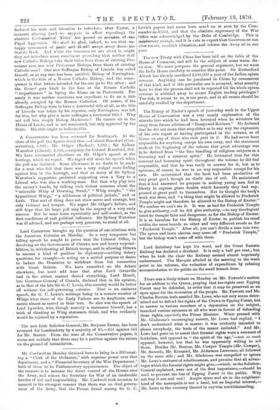The Bishop of Exeter's speech of yesterday week in the
Upper House of Convocation was a very manly explanation of the mistake into which he had been betrayed when he withdrew his essay from future editions of " Fasays and Reviews." He declared that he did not mean that step either as in any way the expression of his own regret at having participated in the volume, or of blame on any of those who took part in it. He had never been responsible for anything except his own essay, and the statement made at the beginning of the volume that great advantage was to be derived from "the free handling of religious subjects in a becoming and a reverent spirit." He intimated that for this reverent and becoming spirit throughout the volume he did feel responsible, and that he was ready to answer for it, but as to opinions, of course he was in no way responsible except for his own. He maintained that the book had been productive of very great good, though no doubt also of evil. He maintained that it had answered its purpose in making young men feel at liberty to express grave doubts which formerly they had sup-. pressed at great peril to themselves. But he thought the book's work was done, and "a thing that might be allowed to Frederick Temple might not therefore be allowed to the Bishop of Exeter." We confess we can't see it. It was as bad for Frederick Temple to give authority,—if he did give authority,—to any theological tenet he thought false and dangerous, as for the Bishop of Exeter. It is as harmless for the Bishop of Exeter to publish his creed within the same boards as other and very different creeds as for "Frederick Temple." After all, you can't divide a man into two. The apron and lawn sleeves may come off "Frederick Temple," but the bishop won't come off with them.
































 Previous page
Previous page